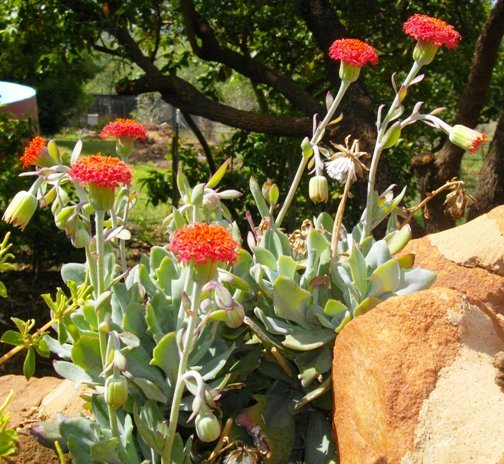Kleinia fulgens

Author: Ivan Lätti
Photographer: Ivan Lätti
Kleinia fulgens is a tender evergreen perennial with soft stems and silver grey leaves. It grows to heights of between 30 cm and 45 cm. The specific name fulgens means shining in Latin, referring to the intense flower colour.
In this photo the three developmental stages of the flowerhead are clearly represented: Firstly there is the pendulous bud covered in a row of green involucral bracts dangling on a peduncle unable to hold it erect. As the flower begins to open, its stalk gains strength, pulling the capitulum gradually into an erect position, like a soldier coming to attention.
Thus arrives the second phase of full flourish, the flowerhead being confidently presented upright to the world for all to admire and the pollinators to make themselves useful.
Lastly, the tiring stalk lets the developing fruit-head down again, bent under the weight of the emerging seeds inside. Each successful disc floret forms one fruit attached to a pappus, a ring of tiny thread-like bristles waiting to act as a dispersal parachute when the moment comes. The head, the white woolly tuft of fruits in full kit is held in position by the involucre until ripeness comes.
Then release, flight on a pappus wing into the world for starting a new life, if blown on the wind to a suitable spot.
The species distribution is in KwaZulu-Natal and the South African provinces north of the Vaal River, as well as in some neighbouring countries.
The habitat is shade provided by taller plants growing in sandy soils. The species is not considered threatened in habitat early in the twenty first century (Capon, 2005; Hardy and Fabian, 1992; iNaturalist; www.succulents.us; http://redlist.sanbi.org).

